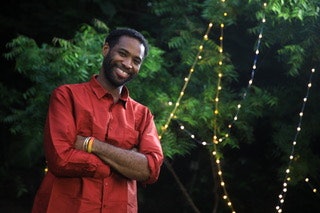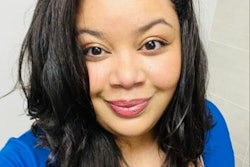
Growing up in Detroit, Jerrard Wheeler was surrounded by examples of service. His grandfather worked as a sanitation worker while dedicating his free time to church and neighborhood committees. His grandmother served as a social worker, always finding ways to help others in her community. These early influences would shape Wheeler’s understanding that meaningful work meant serving people, though his path to that realization would take him from the laboratories of Western Michigan University to the villages of Zambia before landing him to where he is today.
At 36, Wheeler has been named one of ten Rising Graduate Scholars by Diverse: Issues In Higher Education, nominated by Dr. Daicia Price, clinical associate professor of social work at the University of Michigan.
“Jerrard is a visionary practitioner whose leadership is rooted in restorative justice, intersectionality, and community healing,” says Price, who lauds Wheeler’s work in organizing Cultural Heritage Month celebrations, identity-based graduation ceremonies and the Martin Luther King Jr. Week of Events. “Through these initiatives, he has helped create inclusive spaces that celebrate difference while challenging systems of oppression.”
Wheeler’s journey to social work wasn’t direct. Like many students, he entered college with pre-med aspirations, earning a biology degree at Western Michigan University. But something didn’t sit right with the reactive nature of medical practice. “I was more like, how do we prevent people from getting sick in the first place?” Wheeler recalls. At the time, he didn’t know about nonprofit work or social work as broader professions.
After graduation, Wheeler joined AmeriCorps, serving for two years at the Museum of African American History in Detroit. The experience was transformative for someone who identifies as Black and gay — two crucial parts of his identity. “I was really just building up helping connect the museum to the Black community and also just learning a lot about African American history,” he explains.
Despite being offered a full-time position at the museum, Wheeler felt called to international service. In 2016, he joined the Peace Corps, spending two years in Zambia as an environmental volunteer. His work focused on helping communities find new sources of nutritious food, introducing new crops, and working extensively with children. But perhaps more importantly for his future career, Wheeler also served as part of a peer support network, helping other volunteers navigate challenges like village integration difficulties or family tragedies back home.
It was in Zambia that Wheeler’s career trajectory finally crystallized when he met social workers who helped him to understand social work as a comprehensive profession involved in policy, program development, and structural change — far beyond the social services he had initially associated with the field.
Returning to the U.S. in 2018, Wheeler rejoined his former AmeriCorps program, this time as a recruiter. For two years, he helped place approximately 200 individuals in community service positions. When COVID-19 hit in 2020, budget constraints forced the program’s closure, but Wheeler was retained by the University of Michigan-Dearborn in student affairs.
Today, Wheeler serves as an intercultural program manager, supporting multicultural and underrepresented student populations through programming, one-on-one interactions, and community projects. His work exemplifies his belief that individual and community interventions are interconnected. When he noticed several Black male students expressing self-doubt with phrases like “I can’t do this,” Wheeler didn’t just provide individual counseling. Instead, he identified a pattern and created a community response: Brothers Supporting Brothers, a support group that continues to serve students today.
“That’s a good example of me just sort of noticing problems on the individual level, but creating community responses,” Wheeler explains. “For me, it’s all interconnected.”
Currently finishing his MSW at the University of Michigan (he graduates in December), Wheeler has been recognized with multiple fellowships, including the New Leaders in Africana Social Work Fellowship and the Peace Corps Coverdell Fellowship. He also serves on the executive board of the Association of Black Social Work Students.
Wheeler says that his academic journey has been challenging.
“Grad school’s been very exhausting to me,” he admits, surprised by his own reaction to returning to school after years in the workforce. While he once considered pursuing a JD or Ph.D., he’s now focused on applying his MSW to enhance his current work and explore opportunities that blend individual and community practice.
Despite the challenges, Wheeler’s mission remains clear: “create level playing fields for minority people, for people who don’t have access to opportunities.” It’s a goal that connects his grandfather’s community committee work, his grandmother’s social work, his time supporting Peace Corps volunteers in Zambia, and his current efforts supporting students in Michigan.
From detroit to zambia and back, wheeler’s journey illustrates how diverse experiences can converge into powerful advocacy for social justice and community healing.
















